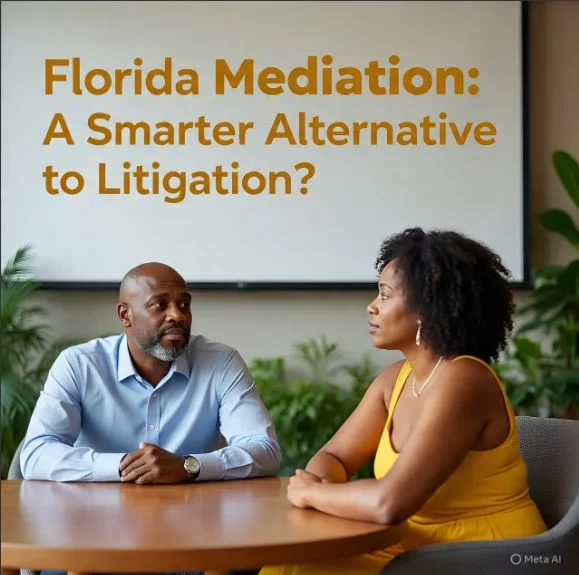Florida Mediation: A Smarter Alternative to Litigation?
Florida courts and practitioners increasingly rely on mediation as a practical alternative to traditional litigation. With trial rates continuing to decline and court dockets often crowded, Florida mediation offers parties a chance to resolve disputes more quickly, cost-effectively, and on terms they control — rather than leaving the outcome to a judge or jury.
What Is Florida Mediation?
Florida Mediation is a structured negotiation process where a neutral mediator helps the parties discuss issues, explore options, and work toward settlement. Unlike a judge or arbitrator, the Florida mediator does not impose a decision. Instead, the process emphasizes communication, problem-solving, and good decision-making by the parties themselves.
Florida has one of the most robust court-connected mediation programs in the country. Mediation is almost always ordered in civil, family, and appellate cases, and many contracts now include mediation clauses as a first step before litigation.
Why Mediation Works in Florida
Several features make mediation an attractive alternative to litigation:
- Cost and Time Savings
- Litigation involves attorney’s fees, discovery costs, and long delays.
- Florida Mediation can often resolve disputes in a single day or over a short series of sessions.
- Flexibility
- Parties can craft creative agreements — such as payment plans, apologies, or business arrangements — that courts could not order.
- Confidentiality
- Florida statutes provide strong confidentiality protections for mediation communications, encouraging open discussion without fear of later disclosure.
- Potential Settlement of Disputes
- Frequently mediations end in full or partial agreements, reducing the risk and uncertainty of trial.
- Preserving Relationships
- Particularly in family, workplace, or business cases, Florida mediation helps reduce hostility and preserve ongoing connections.
Preparing for Florida Mediation
Successful Florida mediation requires more than showing up — it requires planning, strategy, and intentional choices.
- Attorneys should:
- Review the client’s history, goals, and intangible interests (e.g., stress reduction, reputation).
- Evaluate likely court outcomes and costs.
- Develop negotiation strategies with the client in advance.
- Florida Mediators should:
- Prepare logistics and ensure all necessary participants are present.
- Anticipate emotional challenges and potential decision fatigue.
- Facilitate discussion in a way that supports each party’s ability to make informed choices.
Why Florida Mediation Supports Good Decision-Making
The litigation interest and risk assessment framework highlights why Florida mediation can be superior to litigation. By the time a dispute reaches Florida mediation, parties should assess:
- Expected court outcome: What would a judge or jury likely decide?
- Tangible costs: Legal fees, expert expenses, lost productivity.
- Intangible costs: Stress, delay, reputational harm, damage to relationships.
Florida Mediation provides a safe space for parties to weigh these risks against possible negotiated solutions. Often, the certainty of a mediated agreement is worth more than the gamble of trial.
Common Missteps to Avoid
- Treating Florida mediation as a “formality” rather than a serious opportunity.
- Failing to prepare clients for the process, leaving them confused or overwhelmed.
- Overlooking non-financial interests, which can be decisive in reaching resolution.
- Allowing decision fatigue to drive poor choices late in the day.
Conclusion: Mediation as Florida’s Litigation Alternative
Florida Mediation is not a sign of weakness — it is a sign of strategic thinking. In Florida’s legal landscape, mediation offers parties a chance to control their futures, reduce costs, and make durable agreements that reflect their real interests.
For attorneys, mediators, and parties alike, the lesson is clear: treat Florida mediation not as an afterthought, but as an intentional, structured alternative to litigation. Done well, it delivers not





